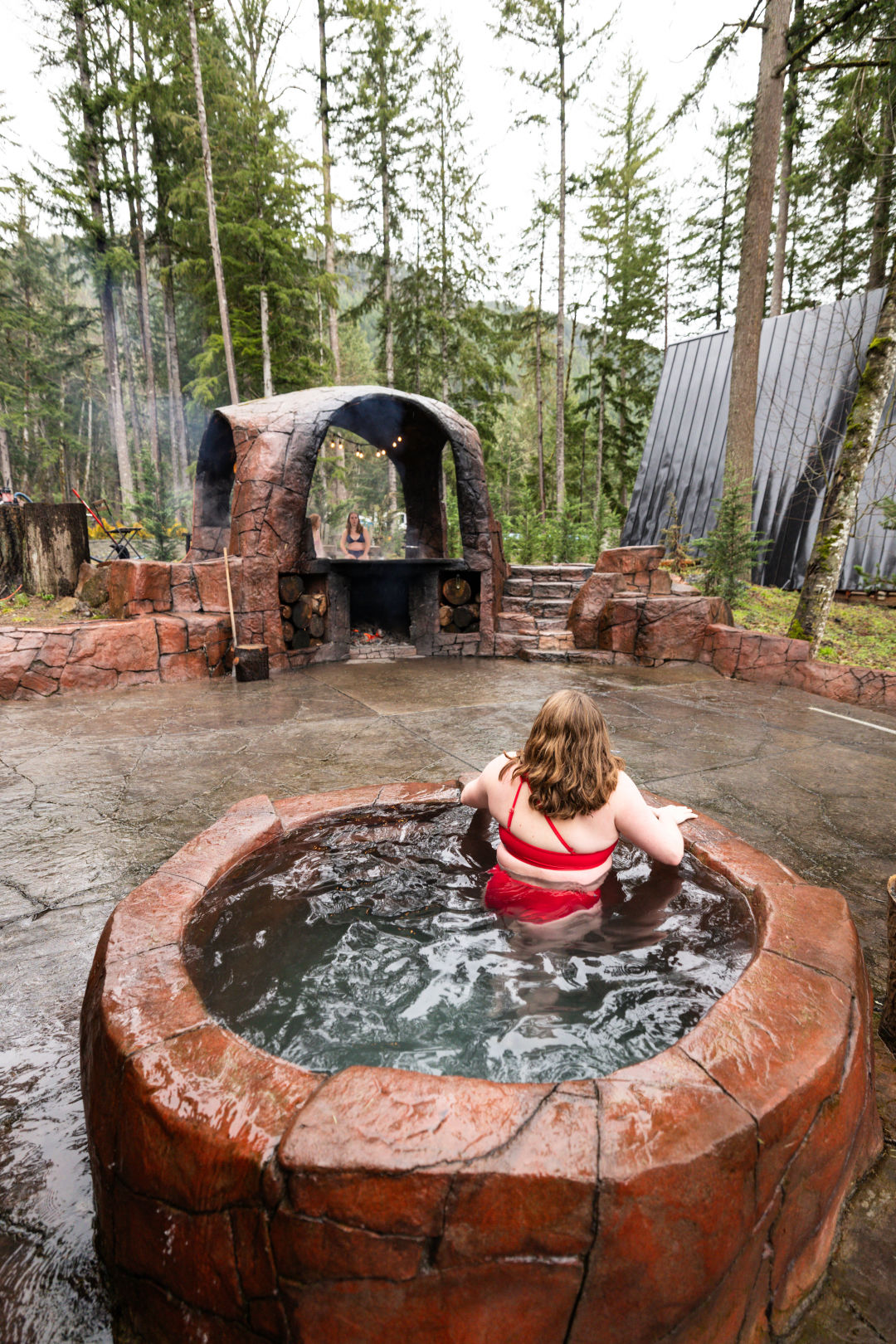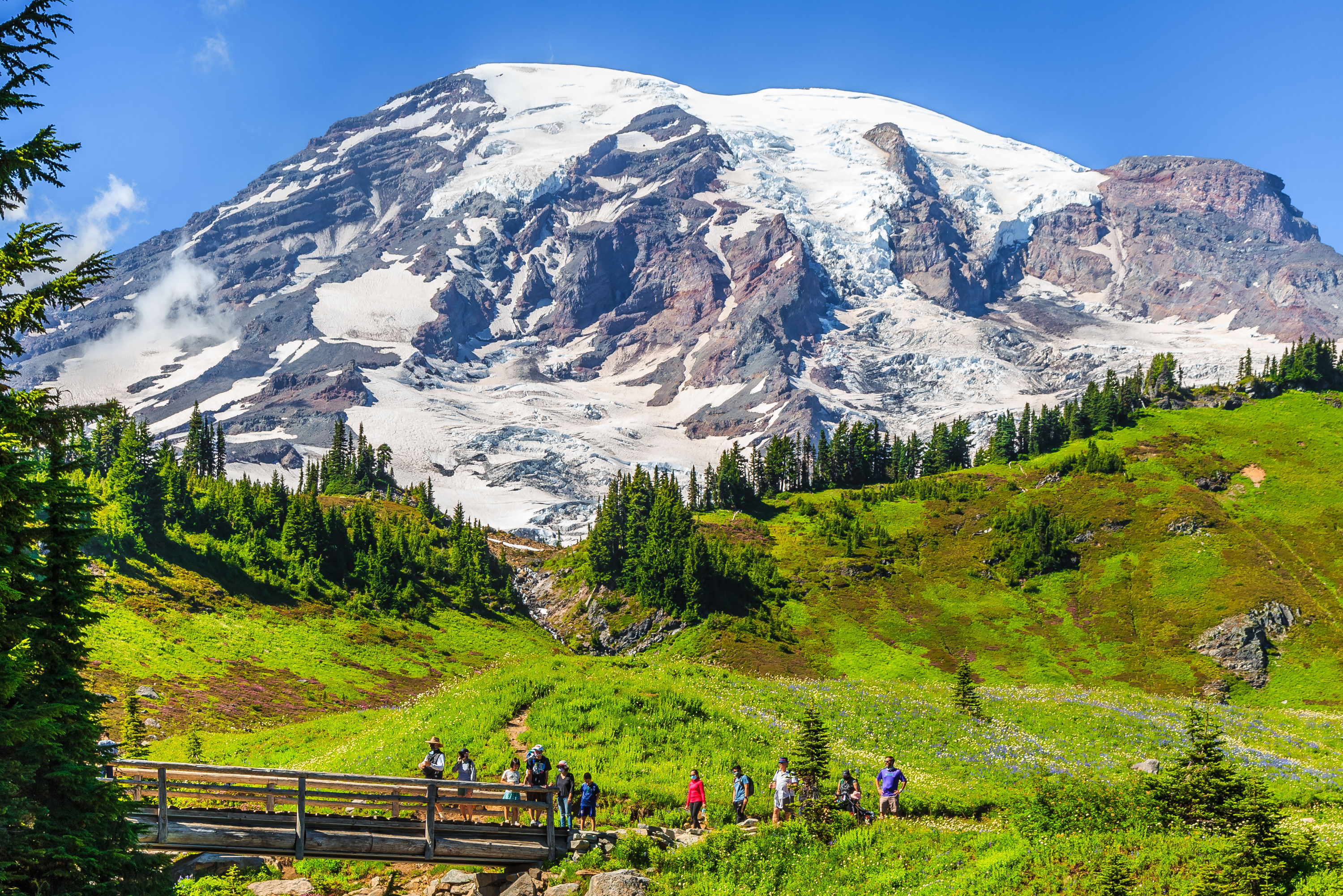There’s a Cannibal Hot Tub near Mount Rainier

Image: Taylor McKenzie Gerlach
Have you ever wanted to be soup? Bobbing in a bubbling stew like a piece of carrot or wedge of potato? It may not be a common fantasy, but in Ashford, a small town on the rural edge of Pierce County, it is an achievable one.
In the center of the Paradise Village Hotel grounds, the Cannibal Hot Tub is a 5,000-pound cast-iron cauldron anchored in a two-level structure made of rebar and concrete. Its high arched roof gives it ceremonial grandeur, textured to look like stone. On the ground level, a wood fire burns in a designated nook lined with bricks, warming the bottom of the human-size kettle above.

Image: Taylor McKenzie Gerlach
Stairs climb to the surface of the tub, a dark pool of water about eight feet in diameter. Big smooth rocks line the bottom, like the boulders on the bed of the nearby Nisqually River, smoothed by the rushing glacier melt. These stones are necessary; the bottom of the tub gets absolutely scorching. This is a hot tub for serious soakers.
Paradise Village owner Anatoliy Zaika created the one-of-a-kind setup himself; he took the idea from his native Ukraine, where the practice of bathing in a chan, or open-air tub, has roots in the Carpathian Mountains. In some ways, the setup is as traditional as it comes; the central metal piece came from Ukraine in a shipping container. It traveled across the globe to reach Paradise Village which sits on the edge of another dramatic peak; the entrance to Mt. Rainier National Park is just 10 minutes down the road. Ashford, a series of shops and hotels spread along a state highway, mostly serves as gateway to the mountain and its recreation.

Image: Taylor McKenzie Gerlach
The name, on the other hand, isn’t traditional at all. Zaika was constructing the tub about five years ago when an Australian guest at the hotel came out to view his progress. “I explained the idea, and then he found me the next morning,” Zaika says. “He said, ‘Hey, Anatoliy, how about the Cannibal Hot Tub?’” (Beyond the sense that, yes, this is what it would take to make sodium-free human stock, the moniker doesn’t have much significance. No tchotchkes or decor that suggest a human buffet or a horror movie.)

Image: Taylor McKenzie Gerlach
Heating the tub takes almost an hour in winter, and Zaika drains it after each use; for that reason rentals start at $140 per hour, bookable in advance by guests of Paradise Village and nonguests alike. The experience is a bit odd—you’re truly in a cauldron, and the bottom feels hot enough to braise an errant toe. But the smell of the wood fire and mountain drizzle completes a compelling scene, one that delivers most of the muscle-friendly benefits of a hot tub soak (no jets, though).
While the Cannibal Hot Tub is Paradise Village’s most unusual component, the small campus has grown since Zaika bought the property about 10 years ago. A small café and bakery operates daily, the pastry case lined with tarts and cheesecakes, plus square slices of spartak cake, an Eastern European delicacy whose thin layers are separated by cream. Next door, a restaurant serves pierogi and gnocchi-like galushki. Oh, and borsch, for anyone not turned off by stew after the hot tub experience.

Image: Taylor McKenzie Gerlach
Zaika and his family have managed to evoke Ukraine in every interior, lining the ceilings with exposed wood beams and giving each window a curved decorative trim. The dining room’s high ceilings are lined with straw and lit with rustic chandeliers. One shelf displays elaborate dolls for sale, crafted by a Ukrainian woman who fled the current war. The motanki, a note nearby explains, are not simply playthings but talismans that serve as “an intermediary between living and dead souls.”
Paradise Village grows in every direction. A handful of tiny homes are now scattered in a field across from the hot tub, and the traditional hotel rooms got a facelift in 2023. A more traditional wood-burning sauna and changing room abuts the hot tub, and a cold plunge completes the rustic spa. Ashford slows down in the winter, even more so in recent years when the national park began closing several days each week due to low staffing, so Zaika is constantly fishing for new ideas.

Image: Taylor McKenzie Gerlach
It’s been 20 years since he left Ukraine—his wife, Maria, now the Paradise Village chef, had relatives in Tacoma. Until the war, he returned to visit regularly. Now he focuses on the pavilion he’s building behind the restaurant, a structure that resembles the skeleton bones of a classic barn. He’ll equip it with more than 100 lights before it debuts as a wedding venue. “It will be truly unique,” Zaika says, but isn’t looking to shock or amuse anyone with the name of the newest construction project. “Probably we will call it Light House.”




